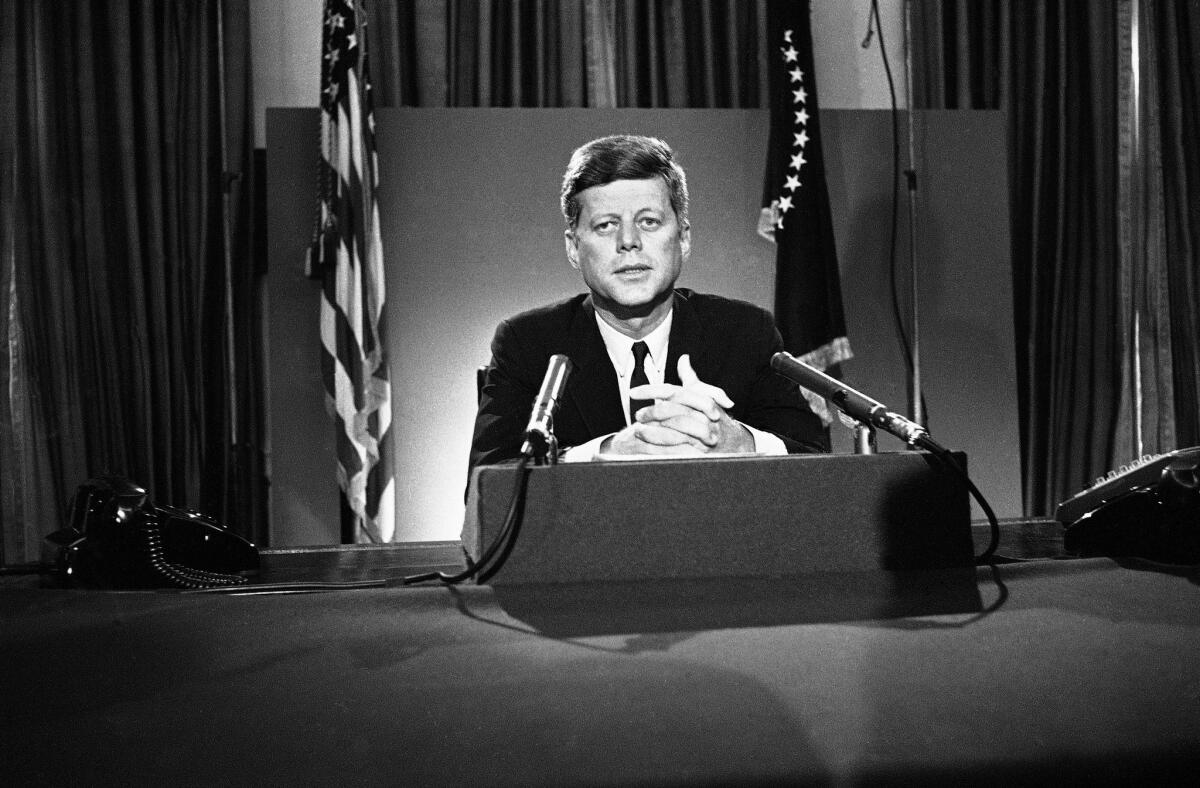JFK, a pioneer in the women’s movement

- Share via
Amid all the dissection of John F. Kennedy’s legacy this week, one achievement has gone largely unnoticed: his role in kick-starting the modern women’s movement.
Admittedly, JFK’s record on women (particularly in his personal life) was mixed, and his Cabinet and policy staff were overwhelmingly male. Nonetheless, in December 1961, Kennedy acted decisively in the interest of women, establishing a national Commission on the Status of Women and appointing Eleanor Roosevelt as its chair. The next year, at the urging of the commission, he ordered federal agencies to end sex discrimination in hiring. And in 1963, he signed into law the historic Equal Pay Act, which prohibited “discrimination on account of sex in the payment of wages by employers.”
Kennedy convened the commission at a critical moment, just as Betty Friedan’s “The Feminine Mystique” was ushering in a wave of anger, excitement and consciousness-raising about women’s role in society. The commission helped direct that energy by bringing together leading women and women’s rights activists and giving them a megaphone. In fact, according to Elizabeth Singer More of Harvard University, many of those women would form the nucleus of the new feminist movement, going on to found the National Organization for Women in 1966.
Of course, as JFK historian Ellen Fitzpatrick points out, it was not Kennedy so much as it was influential Democratic, labor-oriented feminists such as Esther Peterson who shaped the commission and its achievements. But it was the president who got the ball rolling, and his action provides an excellent model that could be replicated today.
As the nation commemorates Kennedy’s life and legacy, President Obama should consider appointing a Commission on Gender and Inclusive Democracy, dedicated to ensuring more women in elective and appointed politics.
Women have taken many steps forward since Kennedy’s time. But they are still sorely underrepresented among the ranks of elected officials. During the time of the original commission, only 20 women served in Congress — just 3.7% of the total number of representatives. Fifty years later, things have improved only slightly, with women at a grossly disproportionate 18%. One can only imagine just how much more could have been accomplished to end gender discrimination over the last half century if more women had been at the table.
In no country have women reached equality without laws to assist them. But laws are made by legislators, and the U.S. ranks 81st in the world in the percentage of women serving in the national legislature. Women are 51% of the population but make up only 24% of state legislatures, 18% of big-city mayors and 10% of governors. At the current rate, gender parity in Congress will take 500 years.
Women’s underrepresentation raises questions of justice and undermines the optimal functioning of democratic government. Research has found that female officeholders raise different issues, forge compromises more readily and are more likely to give voice to the needs of families and vulnerable groups. Yet far fewer women than men run for office.
Our proposed presidential commission would aim to change that. It would draw on a growing body of research to document trends, opportunities and obstacles for women in politics and recommend ways to encourage women and others traditionally left out of electoral politics to seek office.
The commission could also call on both political parties to make progress in recruiting and electing more diverse candidates. The national parties could create target deadlines for increasing the number of women in office and disburse funds to state and local parties that are making progress toward those efforts.
We suspect one key recommendation from the commission would be to encourage younger women to run. The earlier a candidate runs the first time, the better the chance he or she will climb the political ladder. Twelve of the last 19 presidents first ran for office before the age of 35.
In fact, women should be encouraged to run for office in middle and high school. More than 40% of the women who serve in Congress began their political careers by serving in student government. However, research finds that even women who dominated student government in high school often take a step back in college.
It is time for stronger efforts to break the gender glass ceiling in politics. If more women are urged to run for office and given support to do so, more will win and serve. What better way to honor Kennedy’s legacy?
Shauna Shames is a doctoral candidate at Harvard University and a research fellow at Political Parity. Pamela O’Leary is an adjunct professor at American University. Both are members of the Scholars Strategy Network.
More to Read
Sign up for Essential California
The most important California stories and recommendations in your inbox every morning.
You may occasionally receive promotional content from the Los Angeles Times.













